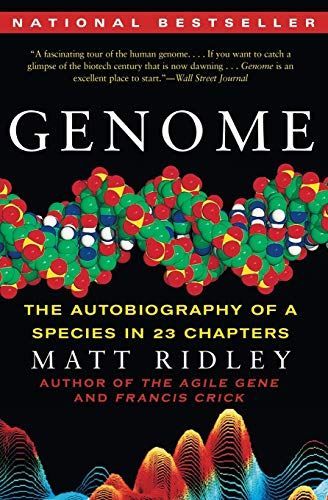
Genome The Autobiography of a Species in 23 Chapters
The genome's been mapped. But what does it mean? Arguably the most significant scientific discovery of the new century, the mapping of the twenty-three pairs of chromosomes that make up the human genome raises almost as many questions as it answers. Questions that will profoundly impact the way we think about disease, about longevity, and about free will. Questions that will affect the rest of your life. Genome offers extraordinary insight into the ramifications of this incredible breakthrough. By picking one newly discovered gene from each pair of chromosomes and telling its story, Matt Ridley recounts the history of our species and its ancestors from the dawn of life to the brink of future medicine. From Huntington's disease to cancer, from the applications of gene therapy to the horrors of eugenics, Matt Ridley probes the scientific, philosophical, and moral issues arising as a result of the mapping of the genome. It will help you understand what this scientific milestone means for you, for your children, and for humankind.
Reviews
Oliver Magnanimous@oliverm
Jeffrey Jose@jeffjose
Nikolina Marković@trueblue
Mher Alaverdyan@mhermher
Sameera@sameera
Lord Aragorn@lordaragorn
Lorelei Petcu@loreleei
Kathy Jedrzejczyk@kathyj84
Maria Otero@mer
Mykyta Barabanov@mukuta
Ethan E. Harris@romeoearwig
Mundy Otto Reimer@mundyreimer
Mykyta Barabanov@mukut
Mirella Hetekivi@euphoricdopamine
Angbeen Abbas@angbeen
Cindy Lieberman@chicindy
lauren carla@laurenslibros
Sabine Delorme@7o9
Margarita Caraballo@mjcara
Judith Junghans@meltingsnow
Marie Rogowski@iamcurie
Brian Alderman@brianaalderman